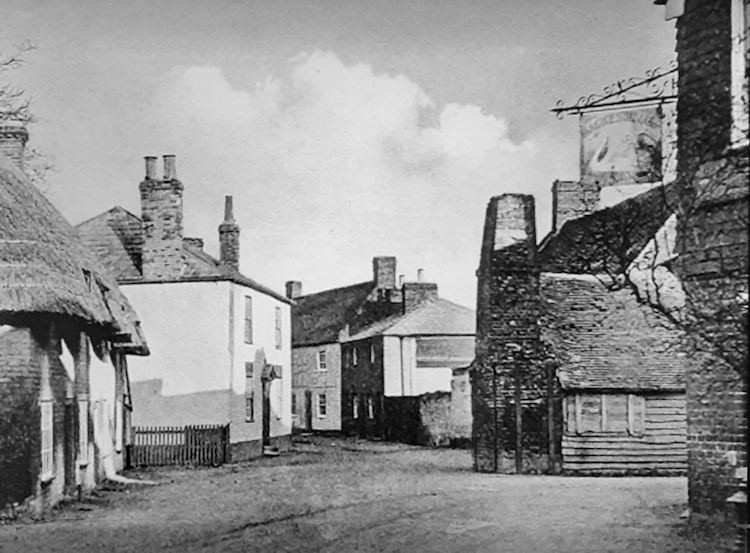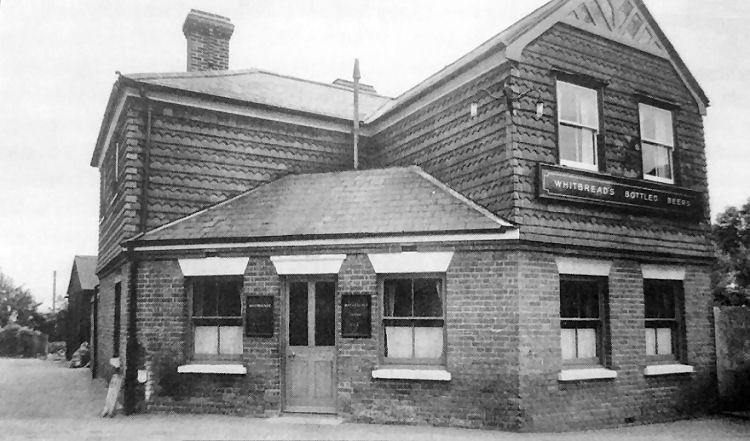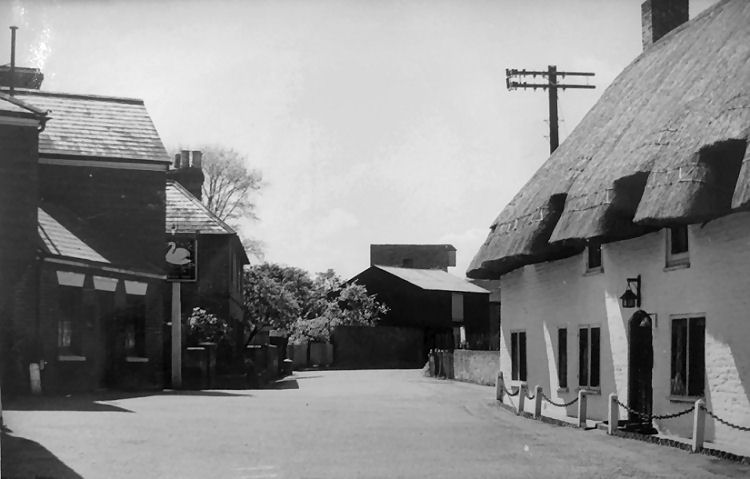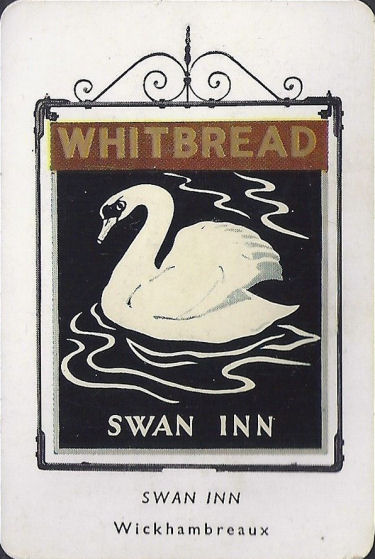|
Wickhambreaux
Canterbury

Above photo, date unknown. |

Above photo, circa 1950, kindly sent by Rory Kehoe. |

Above photo circa 1951, kindly sent by Rory Kehoe. |

Above card issued March 1955. Sign series 4 number 41. |
This pub was renamed the "Hooden Horse" on 21st July 1956 in accordance
with the breweries instructions.
|
From the Whitstable Times, 18 January, 1902.
DESTRUCTIVE FARM FIRE AT WICKHAMBREAUX.
TWO MEN BURNT TO DEATH. THEIR CHARRED REMAINS BEYOND IDENTIFICATION.
A serious fire, unfortunately attended by loss of life, occurred at
Supporton Farm, Wickhambreaux, in the early hours of Sunday morning,
between 1 and 1.30 a.m. the housekeeper to the Messrs. Holdstock Bros.,
the tenants of the farm, aroused Mr. E. Holdstook, who was in the house
with his brother, Mr. P. Holdstook, and announced that the farm
buildings were ablaze. Mr. Holdstock on looking out found this to be
only too true. He partially dressed and went out, and, with assistance,
did all he could. In the meantime the housekeeper, Miss Hayward, went
for further assistance, and although the maroon at Wingham was not sent
up until two o’clock in about twenty-five minutes the local fire
brigade, under Captain Robinson, was on the scene. The Brigade found a
small supply of water at the farm, but it was a useless task to attempt
to put out the conflagration—all they could do was to look after the
stacks in the neighbourhood and endeavour to keep the flames from
reaching the residence of the Messrs. Holdstock. This they accomplished,
and great praise should he bestowed on the members of the Brigade for
their prompt action, for although there were many stacks within a few
yards of the burning buildings the firemen successfully managed to
prevent them from taking fire. There was a slight S.E. wind blowing at
the time and had it been blowing in an opposite direction undoubtedly
the house would have been burned down. The fire originated in the large
barn which was totally destroyed. For a few days previous to Sunday
thrashing had been in progress at the farm and the work was being done
by the Wingham Agricultural Implement Company. About a dozen men were
employed, and it appears four or five of them had been in the habit of
sleeping in the barn at night times, although this was not known to the
occupier of the farm. On the night of the fire apparently there were
three men sleeping on the premises, for during the progress of the fire
one was found in a cart, and he being aroused, escaped with his life the
other two were in the interior of the barn and were unfortunately burnt
to death before assistance could reach them. When found one man was
charred to such an extent that he was unrecognisable. At the inquest
held on Tuesday, a man who had been thrashing with the others, gave
evidence and stated that he could identify the body as that of his
brother from the way he was lying, but the jury were not satisfied with
this and returned a verdict that a man was burnt to death, but that the
body was past identification. In the case of the other man who was burnt
to death the circumstances are even sadder then as regards the one
already referred to. The man was burned literally to a cinder, in fact,
only the skull and a few bones were found. It is not known whom he was.
He was a dark complexioned man, and he was only known by the nick-name
of “Darkie.” Besides this sad loss of life a large quantity of live
stock were burned, while the cow lodge and implement shed were totally
destroyed. All the harrows, ploughs, waggons, carts, and mowers, used on
the farm, were totally destroyed. All the harrows, ploughs, waggons,
carts, and mowers, used on the farm, were burned to such an extent as to
render them utterly useless. Fortunately the farm buildings and contents
are insured, the policies being affected with the County Fire Office.
The barn was full of wurtzel, roots, corn, and barley at the time, and,
of course, all of this was utterly destroyed. The farm belongs to the
Marques Conyngham. The fire apparently originated inside the barn where
the men were sleeping either by the upsetting of a lamp or by lighted
cigarettes or pipes being thrown down. It will he seen by the report of
the inquest below that one of the men was in the habit of smoking
cigarettes, while several pipes were picked up amongst the debris.
Besides the good services of the Fire Brigade the County Police rendered
able assistance at the fire, and Superintendent Jacobs, Sergeant Heard,
P.C.'s Vince, Binfield, Hopkins. Sands, Whitall, and Wells were soon on
the scene. The damage is estimated at between £2,000 and £3,000. As the
inquest was being held by Mr. Mercer on Tuesday afternoon at the farm
house the corn and roots on the site of the fire were still smouldering,
and at intervals broke out in flames. It should he added that the
thrashing machine of the Wingham Agricultural Implement Company was
totally destroyed, but is covered by insurance, and the engine is very
seriously damaged.
THE INQUEST.
The East Kent Coroner (Mr. R. M. Mercer) held an Inquest at Sapperton
Farm, Wickham, on Tuesday afternoon, respecting the death of Charles
William Sylvester. Ernest Holdstock, living at Supperton Farm, Wickhambreaux, stated that
he was one of the occupiers of the farm the Wingham Agricultural
Implement Company were employed to thrush at the farm, and they sent the
engine on Tuesday morning. They thrashed on Saturday. Witness could not
say how many men there were. He did not know any of them except the
driver and the feeder. There would be about a dozen men the driver’s
name was Rose and the feeder's name was Impett. The men did not sleep
about the premises as far as witness knew. He never gave the man
permission to sleep in the barn. On Sunday morning between 1 and 1.30
witness was aroused by Miss Hayward, his housekeeper, who told him that
the barn was on fire. Witness went out as soon as possible and saw the
barn, lodges, and all the buildings round the yard on fire. When witness
was shouting to his brother a man in a cart woke up and got out. The
place was burning for a long while. No one should have slept in the
barn. Witness and his brother returned from Puxton, Stodmarsh, at about
9.30 on Sunday night, and there was nothing unusual then. There was no
light then. Witness knew a lamp and a pipe were found in the barn. Thomas Sylvester, labourer, of no fixed abode, stated that he had a
brother named Charles William, who went with a thrashing machine and
worked for the driver of the Wingham Company. On Friday afternoon
witness and his brother arrived at the farm soon after the engine. They
came to thrash the wheat in the barn. They thrashed on Friday and
Saturday, and it was all then done. On Saturday they went to Wickham
soon after four o’clock. They went to the “Swan” and stayed there about
an hour, and they then went to the “Rose” also at Wickham. They remained
there till 9 or 10, when his brother and another man left. Witness was
left at the public-house with a man whom they called Darkie. Witness'
brother left to go to that farm, and he did not see him again until he
saw the body lying on a wattle the knife produced belonged to deceased;
the deceased never smoked a pipe—he always smoked cigarettes. Witness
was positive that the charred remains were those of his brother. He
could recognise his shape and the way in which he lay when he was
asleep. On the Friday night witness saw where his brother laid and he
was found in the same place so knew it was his brother. He was 29 years
of age and was 5 feet 10 inches in height, and he was very long in his
back. Instead of going back to the farm that night witness slept in a
cabbage field. He was not drunk but he had had a little. When he woke at
7 o’clock he went up to the farm and saw the fire. He wanted to know
then where the body was picked up. Harry Bates, a member of the Wingham Fire Brigade, stated that he was
summoned at about 2 o’clock on Sunday morning, and he, with the Brigade,
got to the fire about 2.35 a.m. He was told that men were sleeping in
the barn. At 3.30 he found the body in the barn the last witness pointed
out the spot where his brother had made his bed, and that was the same
spot where he found the body. When found the deceased was lying on his
chest. On other set of bones had been found besides the deceased—there
was no other complete body found, however. There were two clay pipes
found. The Coroner said he did not want the jury to return a verdict that it
was Sylvester that was dead and then next week for the man to walk round
and say that he slept in a carrot field. He thought that a verdict
should be returned that a man who was past identification was burned to
death. The Foreman of the jury (Mr. A. Sole) agreed with the Coroner, and most
of the jury concurred in what he had said. The jury then returned a verdict that a man was burned to death, but
that he was past identification. |
|
From the Dover Express and East Kent
News, 4 April, 1902. Price 1d.
PUBLIC HOUSE LICENCE ENDORSED
William Thomas Bradley, landlord of the “Swan Inn,” Wickhambreaux, was
summoned for knowingly permitting drunkenness to take place on his
premises on Sunday, March 2nd.
Police Constable Binfield, Littlebourne, gave evidence that on Sunday
evening, March 2nd, at 10.p.m., he saw William Williams, and James
Holman come out of the “Swan.” Both men were drunk, and rolled about in
the road. Next day he called on the landlady, who stated the men had
been in the house since 8.30, but that neither was served with drink.
They were with friends, and he could not help them letting the two men
drink. As the men left they wanted a two-gallon bottle filled with beer,
and the landlord said he refused this because he did not want a row
outside.
Sergeant C. Hearn gave evidence in corroboration.
The inspector said that the two men were fined at the last Sessions,
when they pleaded guilty, and in consequence the Chief Constable ordered
a prosecution.
John Fox, landlord of the “Duke William” public house, at Ickham, gave
evidence that the men left his house at 8.20 p.m. on March 2nd, when the
landlady asked them to leave as they were noisy and the worse for
liquor.
Thomas Mount gave evidence that Williams and Holman were a little the
worse for liquor, but they were quiet, and were not served.
William Williams gave evidence that he was fined for being drunk last
Sessions. He never paid for any drink on March 2nd at the “Swan.”
James Holman, the other man who was fined, now declared that he left the
house sober.
The Inspector: But you pleaded guilty last Sessions to being drunk.
Holman said he was sober when he left the house, but the fresh air took
effect on him, and this, together with a big cigar, caused the drunken
symptoms.
Lord Northbourne asked witness if the “fresh air” often had this effect?
Witness said it did. (laughter.)
Mr. Rutley Mowll, for the defence, urged that there was no cause mad
out, as it had not been proved that, even if the men left the house
drunk (which he could call evidence to prove was not the case), the
landlord knew they were drunk. The evidence had been rather that the men
were quiet in the house.
He called The Defendant, W. T. Bradley, who said that he did not serve
the men, and that they did not appear to be drunk.
Cross-examined: The reason he refused to sell them beer in a bottle was
because it was ten o'clock.
Mr. Mowll then called Edward Harman, James Burrows, J. C. Wyles, Harry
Spicer Harris, William Hill, John Rook, and William Sladden, who each
gave evidence most positively that they either saw the two men leave the
house or in it, perfectly sober all the time.
Lord Northbourn (amidst laughter) asked each witness (all witnesses
having been ordered out of Court) if he knew that Williams and Holmes
had last month pleaded guilty to the charge of being drunk when they
left the house?
The witnesses, one and all, professed to be quite unaware of this.
The Bench, after retiring, decided that the case was a very proper one
to bring before the Court, and it had been proved. The defendant would
be fined 17/6, £2 2s. 6d. costs, and the license would be endorsed.
Mr. Rutley Mowll said the Chairman completely staggered him when he said
the license would be endorsed. He had appeared in a very large number of
licensing cases, and with one exception, a very serious case, the
license had never been endorsed on a conviction. This man had been in
the house for 13 years, and it was obvious that a man did not hold such
a position for 13 years without being a man of respectability.
The Chairman: The Police or the Bench may have been lax!
Mr. Mowll: You surely have confidence in your Police officers!
The Chairman: I make no charge; I only say they may have been lax.
Mr. Mowll said the question of endorsing the license hit someone else.
The defendant had been punished, and he would have to go.
The owners
would not let a convicted landlord remain.
The Chairman asked if that was so?
Mr. Mowll said he would give an understanding that the landlord would
leave the house.
After a minute's consultation, the Chairman said the bench were unable
to alter their decision.
Mr. Mowll then gave notice of appeal, and the bench fixed the
recognisance's at £50.
|
|
From the Whitstable Times, 12 April, 1902.
WICKHAMBREAUX. CONVICTION OF A PUBLICAN. LICENSED ENDORSED.
At Wingham Petty Sessions held on Thursday, William T. Bradley was
summoned for allowing drunkenness on his licensed premises, the “Swan,”
Wickhambreaux. The case arose from two men being convicted, at the
previous sitting of the Bench, for being drunk and disorderly, and the
police summoned Bradley, as the two men were seen coming from the house
a few minutes before 10 on the night of the offence.
P.C. Binfield said he saw the two men come out of the house drunk.
Mr. Mowll appeared for the defence and called the two men, who denied
having been served with liquor. They did have some beer in the house
which their friends treated them to. Although they pleaded guilty to
being drunk when they were charged, they said they were all right when
in the house, but on coming out into the fresh air they seemed to be
overcome.
Mr. Mowll said defendant had been in the house 13 years, and during that
time had conducted it in a proper manner.
The Bench decided to convict, and fined defendant £2 2s. 6d. with 17s.
6d. costs, also endorsing the licence.
Mr. Mowll said the decision to endorse the licence thoroughly staggered
him, as the most serious cases only caused the license to be endorsed.
The Bench declined to alter their decision, and Mr. Mowll gave notice of
appeal.
|
|
From the Dover Express and East Kent News, Friday 2 May, 1902. Price 1d.
THE WICKHAMBREUX LICENCE
The Magistrates granted a temporary transfer of the licence of the
"Swan Inn," Wickhambreux, from William Thomas Bradley, to William Thomas
Setterfield.
Lord Northbourne asked if this was the licence that was endorsed last
month for a conviction.
The Clerk said that it was not actually endorsed, as Mr. Rutley Mowll
gave notice of appeal.
Mr. Bradley said he had now lost the licence, and asked that a
certificate copy should be substituted for transference.
|
|
This extract is from the book "Inns of Kent"; Whitbread
& Co. Ltd.; 1948 :-
Wickhambreux (pronounced locally Wickhambreu-ex) is a picture-postcard
village, complete with green, church, stream and mill house, rectory and
squire's house all very correct and according to Hoyle. The "Swan Inn,"
however, must be sought, never a very tedious job in a village like Wickhambreux; and when found will be just another lovely Kentish house,
warm weather-tiled walls and tiled roof, unostentatiously minding its
own business now as ever. |
Further details hopefully to follow.
LICENSEE LIST
WEST John 1871+ (age 56 in 1871 ) )
KENNETT James 1881+ (age 34 in 1881 ) )
BRADLEY William Thomas 1891-1902+ (age 53 in 1901 ) )
GARSIDE Peter to Apr/1904

MASTERS Mary Grace Apr-Nov/1904

CORNHILL/CORNFIELD William Nov/1904-July/08

AGED Frederick July/1908+

MAYGER Mr Fred dec'd 1918-Jan/24

MAYGER Esther (widow) Jan/1924+

CHIDDUCK Mr W G to Sept/1938

BAKER Mr C J Sept/1938 +

 From the Dover Express From the Dover Express
 Census Census
|



